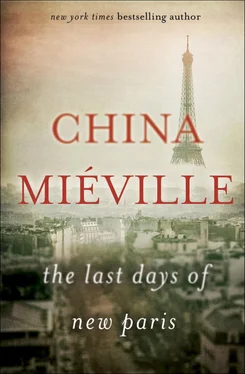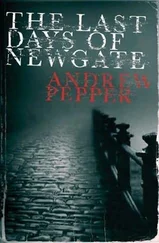She spoke again and did not raise her voice.
“I came a long way, down rue des Martyrs, from the eighteenth, Montmartre,” she said. “There’s too much shit between here and the eighth. I’m glad I found you.”
“I don’t run things,” he said.
“Well. Seems you do. It’s you they wanted me to speak to, anyway.”
“They?”
“They knew where you’d be,” she said. “They—we—want you to join us. There’s a plan.”
She was vague, but almost brittle with excitement. Just beyond the edges of Paris’s Nazi-controlled center, the comrades were amassing.
Thibaut had fingered the card in his pocket. “Come on,” he said, “why do they want me ?”, and watched her shock when he told her at last that he was protecting the ninth.
Thibaut coils and uncoils the whip he took. He winds it densely around itself to make it a baton. He slaps it against his palm.
“This shouldn’t work,” he says. “They can’t control manifs. They shouldn’t have even been there. No one should go into a forest.” He looks abruptly down, right at the pajamas he wears, about which Sam has said nothing. He has to gather himself a moment. “‘Confusedly,’” he says, “‘forests mingle with legendary creatures hidden in the thickets.’”
“Desnos,” Sam says. “And that’s not a warning. That’s why I went in.”
“Was it worth it? To see legendary creatures?” He intends to shame her with the question, with his bitter tone, but she smiles and raises her camera.
In the remains of the Lycée Buffon, the old classrooms are empty but for dust and the carcasses of birds. Thibaut points his rifle at Sam. She does not cower. She places her bags by her feet, like someone standing on a railway platform.
“Listen, American,” he says. He tries to make his voice rough. “I’m Paris. Main à plume.” Liar, he thinks. I shouldn’t even be here. “I’ve fought devils, manifs, Nazis, collaborators, and I’ve killed them all.” The Marseille card is in his pocket, that secret counter of rebellion. “Why were they coming after you? I told you. I’ve never seen wolf-tables like that, or manifs obeying Nazis.”
“No? What about the aeropittura ?” she says.
He blinks. “They hardly count,” he says. Actual fascist manifs, such as those rushing futurist plane-presences, remain very few. “And they don’t obey anyone, fascist or others, they just… lurch about…”
“Fauves?” she said. “The negligible old star?”
For a short time, art-shepherds from the Vichy curators of “Jeune France” had tried to direct the garish strutters walked out of Derain’s canvases, the confusing and melancholy point of gray light self-made from lines written by a Vichy enthusiast. The presences, though, were uncontrollable and underwhelming. Thibaut has heard nothing of the crude bright fauvist figures in a long time, but the star is supposed to still haunt the streets some nights, emanating bewilderment.
“The wolf-tables are Surrealist !” Thibaut shouts. “You can’t compare them to a poem by some stupid American, or fascist scrawls, or Derainist crap…”
“I’ve seen worse than those tables following orders,” Sam says. “A huge thing ripped right out of art. Don’t kid yourself the Reich can’t manifest things sometimes.”
Thibaut narrows his eyes. “You’re wrong,” he says.
She shrugs. “If all my films were developed, I could show you.”
“How do you know so much about all this?”
“You’re not a good interrogator. You’re moving on to new questions before I’ve answered the first ones. Why were they after me? Remember?”
“So why were they?”
“No, let’s skip forward, in fact. I know about all this because it’s my job. I came in weeks ago. I’m from New York. I’m a photographer, and a curator.”
“You came through the barricades ?” Thibaut says. “From outside?”
“Come on. There are ways. You know that. Will you point the rifle somewhere else? I’ve done a decent enough job of staying out of sight, I thought. But when I was in the eighth I realized those officers were following me. With their… dogs. I went south through the Grand Palais. They must have followed.”
Does she understand what she’s saying? Boulevard Haussmann, the avenues des Champs-Élysées and de Friedland, Montaigne and George V: these and the neighboring streets of the sixteenth and seventeenth, around the Arc de Triomphe, are the Nazis’ redoubt.
There are others throughout the city, of course, like the isolated forces of the tenth he’d seen scattered by the Vélo, cut off from each other, or connected by guarded lines. But the headquarters of the SS is on avenue Hoche; the Hotel Majestique is where the military high command still exercises rump power. Rue Lauriston is the headquarters of the Active Group Hesse, French Gestapo auxiliaries, the Carlingue. Those streets are patrolled by officers and the most reliable of their devil-allies.
The whole zone is on military and demonic lockdown. The few Parisian civilians within serve its microeconomy. If manifs intrude there they are pushed out or ended with relentless force.
Very rarely, one resistance group or other might infiltrate, carry out some raid—a theft, the liberation of comrades, a spectacular act of violence. The last time was years ago, and it was Paris itself the rebels had attacked.
De Gaulle had been predictably aghast by the Arc’s changed configuration. When the dreams of the blast passed, the great structure was sedately on its side. The inside of its stone curve was wet, streaming with self-generated urine. A giant’s pissoir.
It delighted Thibaut and all the Main à plume. To the Free French it was grotesque. They sent bombers undercover past the torture rooms, barracks, and ministries where trapped functionaries made strange fascist plans. When dawn came the Free French soldiers triggered their ordnance and with a great blurt of smoke and fire exploded the sideways Arc, showering the streets with rubble and piss.
The stones still lie where they landed, now dry. De Gaulle said he was salvaging Paris’s honor.
It had been a blind, Thibaut knows, to detract attention from the failure of their earlier assault at Drancy, the camp outside the siege and the old city’s arrondissements. The closed, mysterious horseshoe citylet repelled the Free French, to their shame.
And now this tourist claims she walked in, walked out, of that controlled zone.
“I was taking pictures,” she says.
“Of what?”
“Everything. The last thing I saw was the Propagandastaffel.” The censors’ building, where fascist authorities oversee what remains of propaganda and art in a city where art hunts. Which is a great deal. She opens a bag and pulls out a canister of tightly coiled film. “To keep a record.”
She hands him one and nods permission. Thibaut unspools it a little, lets a streetlamp outside the window shine through it. He squints at the tiny images. Occluded streets in negative. Tanks by the pyramid in Parc Monceau, firing in formation at a great sickle-headed fish, a Lam manif swimming violently in the air. A humanish pillar. Thibaut looks closer. It is a woman made up of outsized pebbles, lying down on grass, her legs languorously in the water.
Sam opens her notebook for him to see her neat English handwriting.
“A book,” she says. “The Last Days of New Paris.”
He is quite still. “What?” he manages at last.
“I’m here to put all this down.” She looks at him quizzically. “You don’t think this can remain, do you? It can’t. It shouldn’t. But it’ll still be a tragedy when it ends. Don’t you think this city deserves marking?”
Читать дальше













